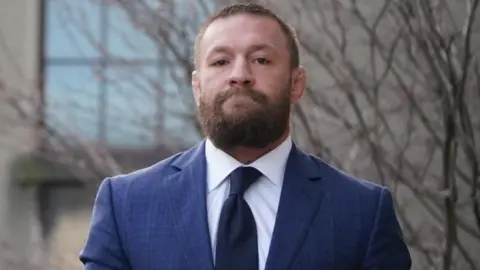In a significant legal development, Conor McGregor, the former mixed martial arts champion and public figure, has encountered a setback in his civil appeal concerning allegations of sexual assault. This decision follows a jury finding him liable for sexually assaulting a woman named Nikita Hand during an incident in a Dublin hotel in 2018. The court originally instructed McGregor to pay damages amounting to £206,000 in addition to legal costs, which McGregor has now appealed.
McGregor’s appeal was fundamentally constructed upon several arguments presenting the case’s legal nuances. His legal team contended that certain statements he provided to the police during investigation interviews should not have been presented to the jury. Moreover, the barrister claimed that the wording of a question placed on the “issue paper” delivered to the jury lacked clarity; specifically, it referred to whether McGregor assaulted Hand without distinguishing the nature of the alleged assault.
The Court of Appeal in Dublin, consisting of three senior judges, scrutinized McGregor’s counsel’s arguments thoroughly but ultimately dismissed the appeal on all presented grounds. The judges maintained that the question posed to the jury incorporated an understanding adequate enough to appropriate the context; the barrister for Ms. Hand articulated the point that the term “assault” generally encompasses a range of violent actions, including the specifics of the sexual assault alleged.
Following this appeal, questions arose regarding the appropriateness of McGregor’s handling of the police interview process. During the civil trial, it was reported that McGregor had provided approximately 100 “no comment” answers to queries posed by the Gardaí, which refers to the national police service of Ireland. His legal representation argued that the jury could draw adverse conclusions based on this refusal to engage with police questioning, infringing upon McGregor’s right to silence. However, Hand’s legal team countered this assertion, stating that if McGregor truly believed the potential for jury misinterpretation was serious, he should have formally requested a discharge of that jury, a move that was noticeably absent from his trial strategy.
The appeal also invoked issues related to the jury’s instructions by the judge during the civil trial. McGregor’s legal team highlighted perceived systemic issues within the trial’s proceedings that warranted reconsideration. Furthermore, McGregor had initially sought to introduce new evidence from Samantha O’Reilly and Steven Cummins, alleged former neighbors of Nikita Hand. This evidence was intended to bolster his defense by suggesting that any bruising on Hand’s body may have been inflicted by her previous partner, Stephen Redmond, rather than as a result of the alleged incident involving McGregor. However, in a strategic decision, McGregor’s team withdrew this application, aiming to consolidate their argument without the complications of introducing additional, disputed testimonies.
In light of these developments, what remains central is the impact this case continues to have on McGregor’s public persona. Once regarded as an invincible figure in the world of mixed martial arts, he now faces a complex interplay of legal battles that threaten to overshadow his sporting legacy. While McGregor retains a robust fan base, the gravity of the allegations and subsequent court findings has inevitably woven a narrative of controversy around his name. The atmosphere surrounding the case elicits nuanced discourse on issues of consent, personal accountability, and the legal frameworks that seek to address allegations of sexual assault.
In conclusion, this case encapsulates a broader conversation about justice—how it is perceived, pursued, and served, especially in matters involving high-profile individuals. The legal repercussions for McGregor, encapsulated by the court’s recent decision, may reverberate through various facets of public life and the legal system, prompting renewed scrutiny in how such cases are handled in the courts of public opinion and law.












